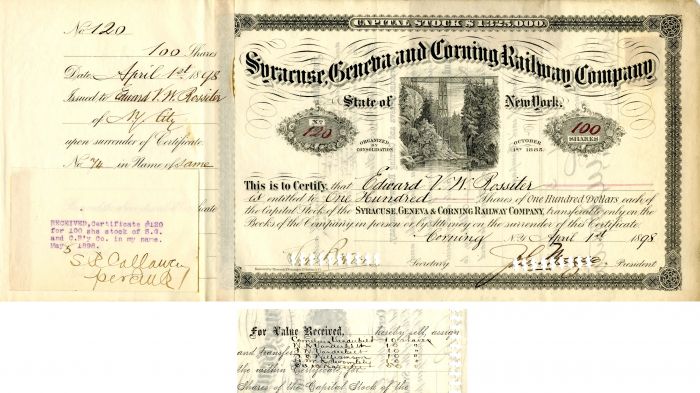Syracuse, Geneva and Corning Railway Co. issued to and signed by Edward V. W. Rossiter - 1890's dated Stock Certificate
Inv# AG2239 Stock

Edward Van Wyck Rossiter (1844-1910) served as the President's clerk for the Hudson River Railroad and held the position of clerk in the Treasurer's office from 1860 to 1867. He was the cashier for the New York & Harlem Railroad from 1867 to 1877. Subsequently, he became the treasurer of the same company and, in June 1883, was appointed treasurer. From November 1900, he also held the role of Vice President for both the New York Central and Hudson River Railroad and the New York & Harlem Railroad, in addition to overseeing nearly all lines associated with the New York Central Company, as well as the Lincoln National Bank and the Lincoln Safe Deposit Company.
On February 4, 1909, the Pine Creek was integrated with various components of the former Fall Brook system, resulting in the establishment of the Geneva, Corning and Southern Railroad, which subsequently merged into the New York Central on December 22, 1914.
The Syracuse, Geneva and Corning Railway was founded in 1875 and commenced operations on December 10, 1877. For a period of 20 years starting in 1881, the company was leased to and managed by the Fall Brook Coal Company. On October 1, 1885, it consolidated with the Penn Yan and New York Railroad Company without changing its name; this company was leased to the New York Central and Hudson River Railroad Company in 1899. In 1909, the company merged with the Geneva, Corning and Southern Railroad, and again in 1914, it became part of the New York Central Railroad (NYCRR).
A stock certificate is issued by businesses, usually companies. A stock is part of the permanent finance of a business. Normally, they are never repaid, and the investor can recover his/her money only by selling to another investor. Most stocks, or also called shares, earn dividends, at the business's discretion, depending on how well it has traded. A stockholder or shareholder is a part-owner of the business that issued the stock certificates.











Ebay ID: labarre_galleries